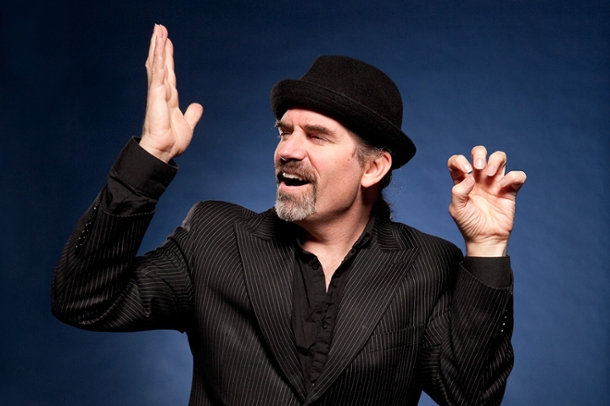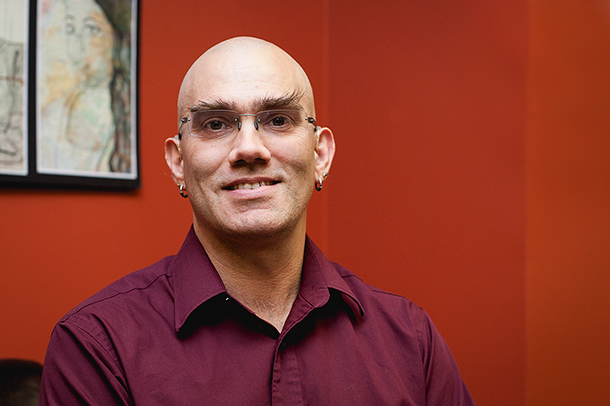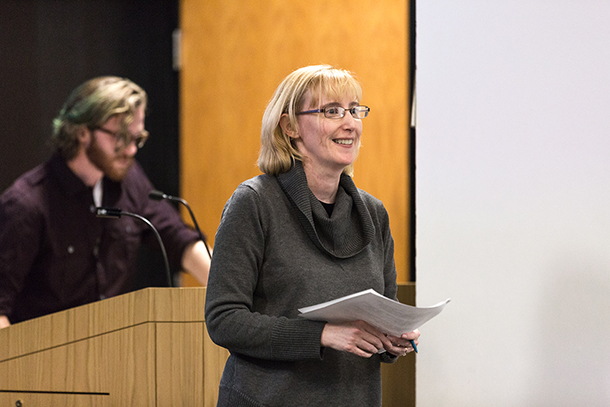ASL-English Interpretation (BA)
The nationally accredited ASL-English Interpretation bachelor’s degree program at Columbia College Chicago is like none other in the American Sign Language community. A bachelor’s degree—a requirement for a national certification in interpreting—will prepare you for a career in interpreting. Our program has a proven record of strong employability among graduating students. But as a product of a highly collaborative, creatively focused arts and media institution, your education will open the door to so much more.
You’ll learn from world-class faculty members who are internationally known in the community for advocating the recognition of ASL as a language and Deaf culture as a cultural identity. They are also known as prominent Deaf storytellers and artists. Columbia’s excellent reputation in the Deaf community opens the door to a wide range of specializations, from educational and performing arts to community-based interpreting opportunities. Our grads work as staff, community, and educational interpreters; video relay service interpreters; and artistic interpreters.
In the Classroom
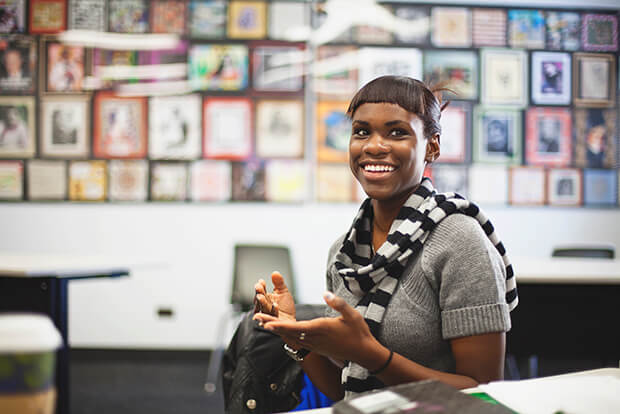
What to Expect Your First Year
Our program is designed to start with ASL 1, but if you have previous ASL experience, whether you're a freshman or a transfer student, you can take a placement test to determine your first ASL class at Columbia. All ASL-English Interpretation students work with faculty members to customize a degree plan. As you develop and perfect your language skills, you’ll take courses in Deaf culture and learn about career opportunities within Deaf communities. You’ll also take elective courses in your areas of interest. Some topics elective courses cover include theatre, art, literature, and history.
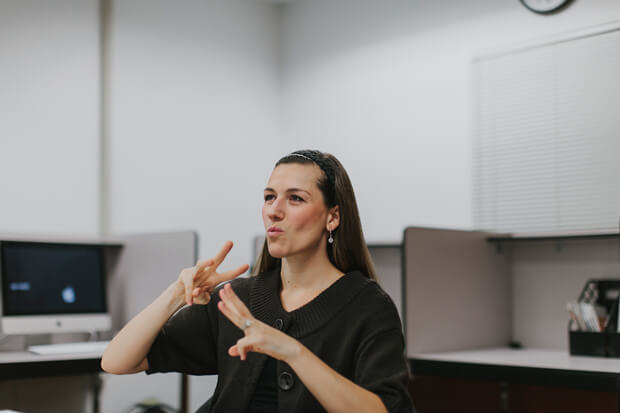
What to Expect Your Last Year
In addition to preparing for your certification and licensure exams, you’ll spend your senior year taking a two-semester practicum. You’ll work with licensed interpreters on the job. As a result of our long-standing relationships both in the Deaf community and with those who work closely with it, you’ll gain invaluable on-the-job experience from professionals who could serve as mentors in your future career.
You’ll also participate in continued intensive language immersion and explore your areas of interest in elective courses.
Practicum Experience
The ASL-English Interpretation bachelor’s degree program at Columbia College Chicago is designed to provide you with real-world experience that goes beyond the classroom. In your practicum—which is required of all students in the program—you’ll be matched with interpreters working in the field and will accompany them on the job in a supervised setting.
You’ll have two different placements your senior year. In the first semester, you’ll be placed in a school. In the second semester, you’ll work with a freelance interpreter or in a government or private organization. Your second semester practicum can take place anywhere in Chicago or—when possible—in another state where you’d like to be licensed.
These two experiences allow you to connect with professional interpreters who can mentor you as you prepare to launch your interpreting career.
Community
From day one, you’ll be part of Columbia’s unique Deaf community, one that belongs to the broader Deaf community and contributes to the creative accomplishments that make the college what it is. Students can practice their language skills by
- Joining the ASL Club, a nationally recognized group of dedicated ASL students who are active within the Deaf community
- Participating in Deaf events in Chicago, such as ASL-only coffee hours, ASL interpreted theatre events, and ASL improv nights
- Volunteering for Deaf community-based projects
Faculty
Our faculty includes internationally known Deaf storytellers and artists, professional interpreters, and published linguists. Our faculty members elevate the reputation of Columbia’s ASL Department as a destination for and advocate of Chicago’s Deaf and Hard of Hearing community.
K. Crom Saunders
K. Crom Saunders teaches students how to move from ASL to English (and vice versa).
Diana Gorman Jamrozik
Diana Gorman Jamrozik believes students who take ASL courses are part of a “revolution” in Deaf awareness.Alumni
Our alumni are in demand. In fact, 85 percent of them work in the field after graduation. Once you are nationally certified, there is no shortage of interpreting jobs in social service agencies, community organizations, or schools. Here are just a few of our alumni stories:
- Yasmine Austria ’15: An interpreter for the Federal Emergency Management Agency (FEMA), Yasmine works with the Disability Integration cadre on St. Croix in the United States Virgin Islands.
- David Rice ’15: A master’s degree student in Interpreting Studies at Western Oregon University, David has worked in a variety of freelance and educational settings, including the City Colleges of Chicago.
- Lal Horan ’12: After earning an interdisciplinary degree in ASL-English Interpretation and Humanities, Lal earned her MA in Teaching English to Speakers of Other Languages at Portland State University. She serves as a Peace Corps volunteer, teaching English to university students in Guizhou, China.
- Kaylee Magro ’11: Kaylee is a full-time sign language interpreter in Nashville, Tennessee, specializing in performance interpreting. She also cheers for the Tennessee Titans and freelances.
- Tiffany Sersen ’08: Tiffany is an interpreter in Washington, D.C. A certified yoga instructor, she provides ASL interpretation for yoga classes.
- Susan Sotnick, NIC ’05: Susan is a full-time interpreter at Goodwill Great Lakes Naval Base. She has done more than 50 interpreted performances for professional Chicago theaters, including Steppenwolf Theatre, Chicago Shakespeare Theater, and the Goodman Theatre. Susan also served as a faculty member in Columbia’s ASL Department from 2010 to 2016.
Related Programs
ASL Studies Minor
The ASL Studies minor will give you the opportunity to learn American Sign Language and broaden your understanding of Deaf culture and the resources available to the Deaf community. It will also teach you invaluable, transferrable skills as you prepare for a career in the profession of your choice.
